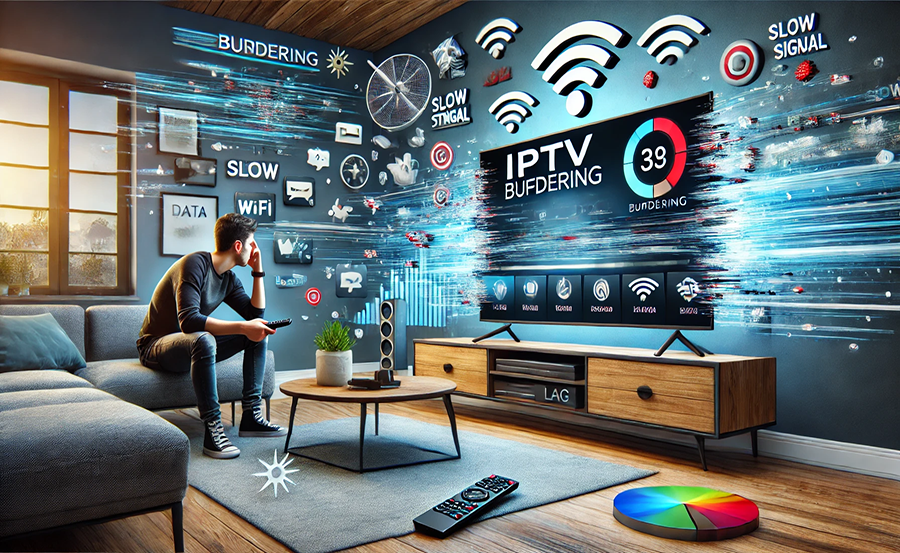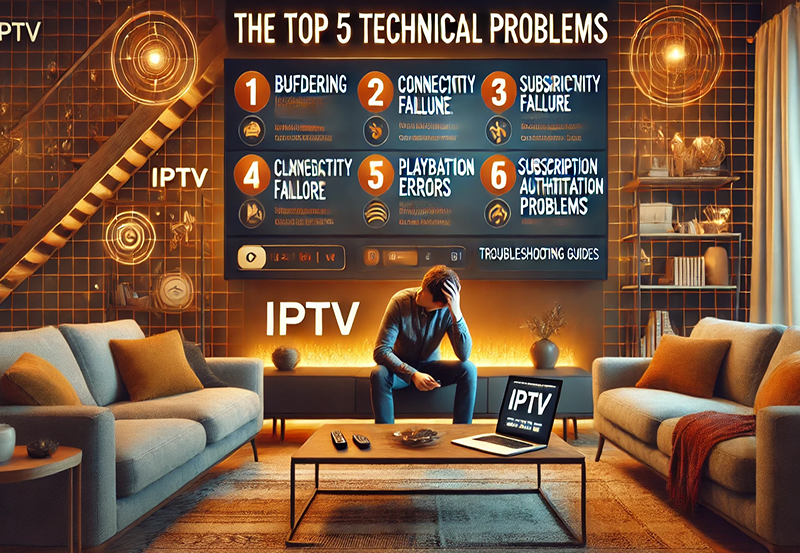In today’s digital age, buffering issues on IPTV platforms can turn a thrilling movie night into an exercise in frustration. If you’ve ever experienced the infuriating spinning wheel on your screen just when the plot thickens, you’re not alone. Many IPTV subscribers face similar issues. This comprehensive guide aims to unravel the mysteries behind why your IPTV might be buffering and how to fix it effectively.
Understanding the Basics of IPTV
Before we dive into solutions, let’s clarify what IPTV is and why it’s becoming a preferred choice for many. Internet Protocol Television (IPTV) broadcasts television content via internet protocol networks. Unlike traditional satellite or cable, IPTV offers a more flexible and on-demand service. However, even with its advantages, IPTV isn’t immune to technical hiccups like buffering.
Buy 1 Year IPTV Subscription and Enjoy Unlimited Content
Key Features of IPTV
IPTV allows users to stream content directly over the internet, providing a seamless viewing experience—when everything works as it should. Some primary features include:
- On-demand video content
- Live TV broadcasting
- Time-shifting capabilities
Each of these features relies heavily on a stable internet connection, which can sometimes be interrupted by various factors, leading to buffering.
Why Choose IPTV Over Traditional TV?
For IPTV beginners, the appeal often lies in its flexibility and the vast array of content. It provides you with unlimited access to a global range of channels and shows. Unlike cable, it doesn’t tie you to a fixed schedule, allowing for binge-watching at your own pace.
Despite this freedom, buffering can hinder the experience. So, enhancing your viewing pleasure by addressing these problems is paramount.
Common Causes of Buffering on IPTV
Buffering issues can originate from various sources. Understanding these can help you implement more effective solutions. Let’s examine the most prevalent causes:
Inadequate Internet Speed
Arguably, the most frequent cause of IPTV buffering is insufficient internet speed. Streaming high-definition or 4K content requires a robust and stable internet connection. If your internet speed can’t keep up with your IPTV demands, lag and buffering are inevitable.
Router and Network Congestion
The capacity of your router impacts the quality of your connection. A congested network—where multiple devices are connected simultaneously—can spread your bandwidth thin, causing IPTV to buffer.
Tips to Reduce Network Congestion
Minimize the number of devices connected while streaming content. Additionally, positioning your router centrally in your home can ensure even distribution of the Wi-Fi signal.
Weak Wi-Fi Signal
Distance from the router often results in a diminished Wi-Fi signal strength, which can lead to interruptions. The greater the distance, the weaker the signal and the higher the risk of buffering.
Practical Solutions to Fix IPTV Buffering
Tackling IPTV buffering requires a systematic approach. Here are practical solutions to enhance your viewing experience:
Upgrade Your Internet Plan
If your current plan doesn’t meet the demands of streaming high-quality content, it might be time to consider an upgrade. Look for plans offering higher bandwidth and speed to accommodate uninterrupted IPTV viewing.
Optimize Your Wi-Fi
Ensuring your Wi-Fi is optimized can effectively combat buffering. Here’s how you can improve your Wi-Fi performance:
- Position your router at a central location.
- Avoid physical obstructions like walls and furniture that can block the signal.
- Change your Wi-Fi channel to minimize interference.
Utilize Wired Connections
Whenever possible, connect your device directly to the router using an Ethernet cable. Wired connections provide a more stable internet connection than Wi-Fi, reducing the chances of buffering significantly.
Invest in a Quality Router
If network congestion remains an issue, investing in a high-quality router with advanced features can significantly boost your signal strength and coverage.
Advanced Techniques to Enhance Your Viewing Pleasure
Beyond basic solutions, advanced users might explore these techniques for optimizing their IPTV experience:
Stream at Off-Peak Times
Using IPTV during less busy periods can alleviate bandwidth issues. Streaming content during off-peak hours is more likely to provide a smoother experience with minimal buffering.
Regularly Update Firmware
Manufacturers often release updates to improve device performance and security. Regularly updating your router’s firmware can help fix bugs and optimize its functioning.
Use Quality of Service (QoS) Settings
Many modern routers come equipped with QoS options. By configuring these settings, you can prioritize your IPTV traffic over other internet uses, ensuring consistent content delivery.
Additional Tips for a Smooth IPTV Experience
These additional tips can further help in mitigating buffering concerns:
Monitor Your Usage
Keeping an eye on your internet use can help you identify potential bottlenecks. Track usage patterns to see if adjusting habits can alleviate strain on your network.
Contact Your Service Provider
If problems persist despite trying various solutions, consider reaching out to your internet service provider. They can conduct tests and possibly offer solutions tailored to your setup.
Consider an IPTV Subscription with Guarantees
Some IPTV providers offer subscriptions with buffering guarantees. If buffering issues continue to nag, switching to a provider with such assurances can be a viable solution.
Embrace a Buffer-Free IPTV Future
A smooth, buffering-free IPTV viewing experience is within reach. With the right internet setup, enhanced equipment, and strategic usage practices, your IPTV viewing can be seamless and enjoyable. Given the increasing popularity of high-definition content and expansive IPTV subscription options, addressing buffering issues now will benefit you in the long term, leaving you free to explore and enjoy new content at your leisure.
Frequently Asked Questions

Why does IPTV buffer on a fast internet connection?
Even with high-speed internet, factors like network congestion, outdated router firmware, or too many connected devices can cause buffering. Addressing these can improve your IPTV experience.
Can upgrading my IPTV subscription reduce buffering?
While an upgraded subscription might offer better server access or higher-quality streams, it won’t solve buffering issues related to your Wi-Fi or internet speed.
What’s the advantage of a wired connection over Wi-Fi for IPTV?
A wired connection provides a direct link to your router, reducing interference and offering a more stable connection ideal for streaming content, thus minimizing buffering.
Do all routers support Quality of Service settings?
No, not all routers have QoS settings. It’s typically found in more advanced or higher-end models, allowing you to manage bandwidth distribution effectively.
Is buffering more common with high-definition content?
Yes, buffering is more prevalent with HD or 4K content as it requires more bandwidth. Ensuring your internet plan and equipment can handle the load can mitigate this.
Best Practices for Optimizing IPTV Streaming Over Wi-Fi





